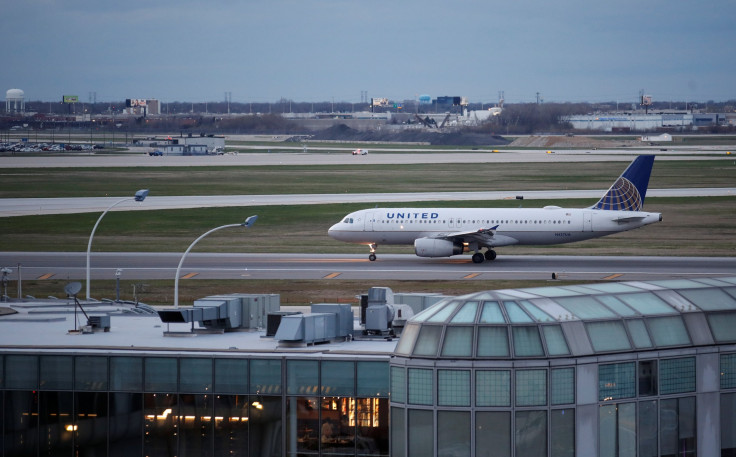How Much Can Airlines Pay You For Getting Bumped? United Owed Man Removed From Plane Up To $1,350

Not long before Chicago airport security staff dragged a passenger off a United Airlines flight Sunday evening, the carrier offered future-flight vouchers worth $400 and then $800 to anyone volunteering to give up a seat, along with a stay at a nearby hotel, one passenger told the Courier-Journal in Louisville, the flight’s destination. Depending on the delay caused by his displacement, United could have paid the man involuntarily removed from the flight up to $1,350 — but no more than that, because there’s a federally-mandated cap on how much the airlines can reimburse flyers involuntarily denied boarding, or “bumped.”
@United overbook #flight3411 and decided to force random passengers off the plane. Here's how they did it: pic.twitter.com/QfefM8X2cW
— Jayse D. Anspach (@JayseDavid) April 10, 2017
@united @FoxNews @CNN not a good way to treat a Doctor trying to get to work because they overbooked pic.twitter.com/sj9oHk94Ik
— Tyler Bridges (@Tyler_Bridges) April 9, 2017
While first introduced by the now-obsolete Civil Aeronautics Board in the 1960s, legally-required compensation for airline passengers who get booted from overbooked flights was implemented by the Department of Transportation in 2008, with a limit. The DOT raised that cap several times since to its current level of 200 percent of the ticket price, up to $675 for those whose replacement flights would leave them delayed between one and two hours, and 400 percent of the ticket price, up to $1,350 for those left with a delay of more than two hours once they’ve been escorted from the plane. (For international flights, the cap changes after a delay of four hours instead of two.)
Read: United Airlines Boycott Reaches Vietnam Over US Doctor Dragged Off Flight
These rules apply only to involuntary forfeitures of flight seats. For those who leave voluntarily, airlines tend to offer flight vouchers, giving customers a reason to stick with the airline rather than taking their money to the competition. In many cases, passengers end up paying the original airline additional money above the value of the voucher for a new ticket, according to Henrik Zillmer, CEO of the passenger rights site AirHelp. There is no mandated compensation for passengers who voluntarily give up their seats, only a requirement by the DOT that the airline ask flyers to volunteer before it chooses who has to go — and pays them accordingly.
“It’s a very good business for the airlines,” Zillmer said, adding that because less than a tenth of a percent of passengers get bumped — only 0.0075 percent involuntarily — the airlines “don’t see it as a problem.”
Still, when the DOT raised the limit in 2011, it faced pushback from airlines and industry groups like the Air Transport Association, now named Airlines for America (A4A). The group argued that increasing the cap would lead customers to hold out on offers to leave the flight of their own volition as the airline gradually bid up the payment offer, therefore making the vouchers less attractive. Southwest Airlines, a document on the 2011 cap increase said, advocated for maintaining the cap at its previous level; Delta Air Lines didn’t want the rule to apply to tickets purchased before its enactment and the Regional Airline Association, another trade group, opposed the heightened cap, “asserting that these increases far exceed the costs of most regional airfares.”
Major airlines did not respond to calls and emails from International Business Times seeking information about the cost of their passenger bumping compensation. A United spokesperson said the company did not have that data available, and she did not answer questions on the specific offers made to the man removed from the Sunday flight in Chicago.
A4A, whose PAC receives tens of thousands of dollars from airlines and spends nearly as much on predominantly Republican Congressional candidates each year, doled out $6.3 million on industry lobbying in 2016, according to OpenSecrets. Among its biggest beneficiaries was Senate Majority Leader Mitch McConnell, R-Ky., the husband of Transportation Secretary Elaine Chao.
“The airlines lobbied for [the cap] to be as low as possible,” said Paul Hudson, president of the airline consumer organization FlyersRights.org, adding that he believed the level of voucher-based compensation offered and the airline's lack of clarity regarding the money the man was owed may have “played a big role” in the United incident. “If they got up in front of the plane and waved around $1,000, things would’ve gone differently."
Read: Mobile App Users Give United Airlines One Star Rating After Passenger Is Dragged From Plane
Four airlines faced relatively small fines in August after they did not disclose overbooked passengers' compensation rights. In 2013, the DOT charged Delta $750,000 for doing the same. The DOT announced Monday that it would look into the recent United episode.
US Dept of Transportation looking into the United incident as well pic.twitter.com/fXujb8HpB5
— Michael Del Moro (@MikeDelMoro) April 10, 2017
© Copyright IBTimes 2025. All rights reserved.






















